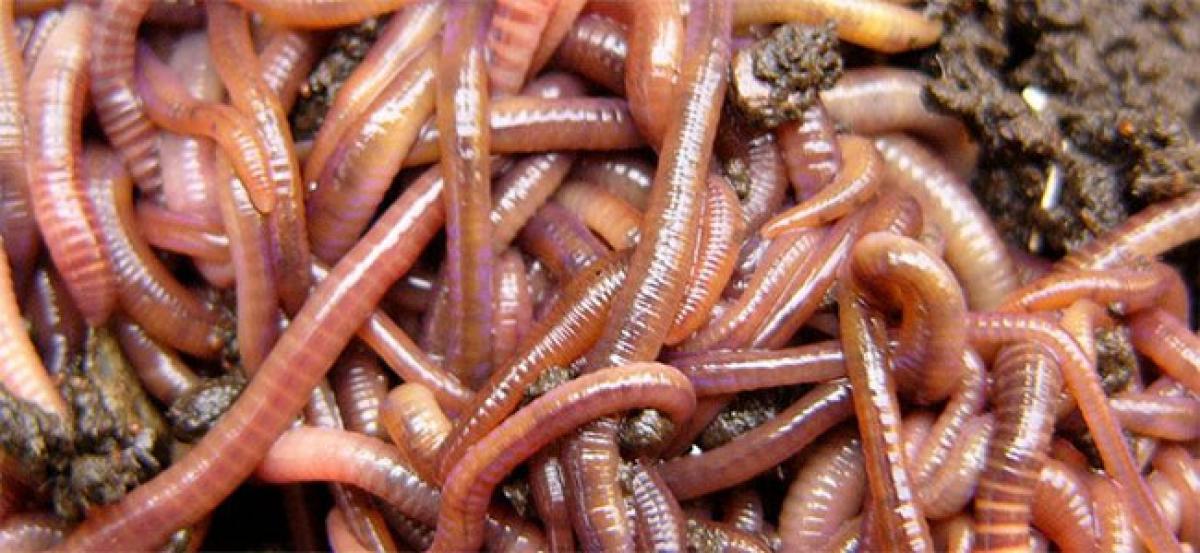Live
- BJP’s ‘Maha’ focus on Telangana
- Revanth govt plans to corner BRS with land report
- Horoscope for November 28: Decoding Cosmic Clues for All Zodiac Signs
- Aishwarya Rai Bachchan’s Sister-in-Law Shrima Rai Shares Cryptic Post After Taking a Dig at Her
- Karnataka: Congress ministers indulge in lobbying ahead of Cabinet reshuffle
- Sujata joins duty after Odisha govt rejects leave extension
- Tur, urad prices have fallen in last 3 months: Govt
- NASA Alert: 130-ft Asteroid 2024 WQ2 Racing Past Earth at Over 62,000 km/h – Should We Be Concerned?
- What is UNSC Resolution 1701 and How it Relates to the Israel-Lebanon Ceasefire
- CM Mohan Majhi reviews preparedness at BJP state office ahead of PM Modi's visit
Just In

Illegal transportation of earthworms from Pulicat Lake is going on unchecked, thanks to the greedy aqua farmers. These earthworms are food for migrant birds that visit the breeding places of the district from many parts of the globe.
Nellore: Illegal transportation of earthworms from Pulicat Lake is going on unchecked, thanks to the greedy aqua farmers. These earthworms are food for migrant birds that visit the breeding places of the district from many parts of the globe.
Highlights:
- Every day more than one tonne of earthworms are being transported to many aqua units with the support of local corrupt officials
- The traders pay `800 per kg to the local people and sell at `3,000-4,000/kg
- Experts say the frequent exploitation of vermin is dangerous to ecology
in the Lake area
Instead, they end up in various hatcheries. A news report on this issue titled Earthworm exploitation hits Pulicat biodiversity was published last year (The Hans India, 18.2.16 edition). Yet, more than a year later this activity has not shown any signs of abatement. Every day more than one tonne of this worms are being transported to many aqua units with the support of local corrupt officials.
Even though popular e-commerce sites such as eBay India, Amazon and others are selling the silicone and plastic worms online at cost ranging from Rs 1.65-17 each for attracting the fish, these traders and aqua unit owners are purchasing live worms at cheaper cost in bulk quantity engaging local tribes and other coolies for collecting the material.
Every month forest officials are somewhere booking nominal cases against illegal transporters who shift worms on a regular basis. They transport packed boxes through trains, RTC buses, cars and even travel services for sending to Chennai and AP based hatcheries across the state.
“Earthworms are rich food for the aqua products. Most farmers apply fertilisers and all kinds of manure such as bran, husk, stover and other matter on their farms to improve production. However, they are now adopting a new technology of using earthworms to serve the same purpose.
Poultry and fish farmers can give their chicken, fish and prawns either live worms for the feeding process,” said K Venkateswara Rao, a retired scientist. He also added that many research institutions across the globe also found good results with the earthworm culture and its use in the aqua industry.
But, pitiably, these avaricious traders and unit owners were making money with the parent stock collected from Pulicat Lake at nominal amounts engaging local jobless. The traders pay Rs. 800 per kg to the local people and sell at Rs. 3,000-4,000/kg. In terms of money, one tonne is around Rs 30-40 lakh in open market, according to a trader.
But, they were purchasing at Rs 600-800 per kg providing wages to the workers. Earthworms are part of vermiculture and they are very useful as bio-reactor to multiply beneficial soil and decomposition of microorganisms. Experts say the frequent exploitation of these vermin is dangerous to ecology in the Lake area.
“This activity would lead to decreased number of winged guests from other parts of the globe if they find no prey for them in the Lake area. A dangerous sign where officials must respond seriously as it affects prospects of tourism. No one is taking care of this aspect,” said K Parasuram, an agriculture student from Sullurpet.
Collecting earthworms has been banned by the forest department for protecting rich biodiversity of the Lake and still people were collecting the worms and have been transporting through various means on a regular basis. Government of India has notified southern Pulicat area falls under Tamil Nadu as protected area in 1980 and northern part located in Andhra Pradesh in 1997.
Pulicat Lake, a saline backwater creek which spread in five mandals in Nellore, is spread over 640 sq km and lies along the coasts of Andhra Pradesh and Tamil Nadu and is one among 21 such protected areas across two Telugu states.
These Protected Areas are governed under the provisions of the Wild Life (Protection) Act, 1972, and Indian Forest Act, 1927, Forest (Conservation) Act, 1980, Environment (Protection) Act, 1986 and Biological Diversity Act, 2002 and the Scheduled Tribes and Other Traditional Forest Dwellers (Recognition of Forest Rights) Act, 2006.
“The smuggling is going on in the protected area and we have formed teams to nab the offenders and have been collecting compounding fee from the violators. No criminal cases are booked against them,” said M Hima Sailaja, DFO-Wildlife wing, Sullurpet.

© 2024 Hyderabad Media House Limited/The Hans India. All rights reserved. Powered by hocalwire.com







